The boisterous punk rap of Los Angeles-based Paraguayan artist Josh Sanchez is not to be slept on. Recording as Kurupi, the lively, eccentric instrumentals that underpin his impassioned and pensive rap cumulate into an exciting and unique sound. The lyrical leanings into his Paraguayan Guarani heritage help Sanchez truly feel like an artist of his own, carving out a cultural space which he feels is missing from music.
Merry-Go-Round is thrilled to premiere the single “Patterns,” which follows 2023’s MANO EP. The song is a skittery, indie rock-inspired jam with a doomy and melancholic undertone drawing from personal turmoil after Sanchez lost a number of people close to him during 2020. “Patterns” comes ahead of Sanchez’s debut album, NO ESPERES, an album reflecting on said themes and is out officially May 31st via Hit The North, which you can pre-save here!
We spoke at length with Sanchez about the new single “Patterns,” his musical inspirations, and fostering a sense of community through his new album.
The first thing I want to say is, congratulations on your debut album! It must feel really good to finally get it out there.
Josh Sanchez: Yeah, it’s been a long time coming. It’s something that I made years ago and it’s crazy to think that it’s finally coming out.
You recorded a lot of it during 2020 and in quarantine. How does it feel to have the album put together all these years later?
JS: It’s a trip. It really takes me back to originally living in Northern California where I grew up, and that year—like, I’d just graduated high school—just all those memories, the people that were there and stuff. I feel good that it honors a certain moment in time, you know what I mean? It’s crazy because any time I listen to it, I can feel what winter felt like then and how cold it was, or I remember the smell of my friend’s house where I recorded verses. It takes me back to that time period.
That’s cool. I know the recording process was entangled in grief too—a few people close to you tragically passed away. By seizing that tumult to make this album, did that help with the grieving process?
JS: Yeah, one hundred percent. I feel like there are certain things that I have a hard time with—even right now—articulating and explaining how I feel about them. I’ll write music and be talking about a feeling and not understanding what it was, it’s just whatever was in my headspace. Then, it’ll be like years later, or months later, or whatever, and I’ll go back to it and think, “Oh, I’m talking about this,” and that is helping me process and understand what I feel.
It’s interesting because quarantine was such an isolating and insular time. You wrote most of the songs during that period, but here’s your album with so many people behind it. How do you feel about it becoming such a communal thing?
JS: I feel like it’s a big part of my music. I mean, most of my music I do write by myself, but usually when it comes to recording, I really like to lean on my friends and have my friends lean on me. Like, where some of us may come short on some things, we can help the other one out. To put it in perspective, the album was all, like… I didn’t even have a microphone at home at the time. I just recorded on my phone. I remember I had my guitar and a little practice amp and I’d just put my phone down, put headphones in, and recorded it by strumming it onto Logic on my computer and did it like that. Then 2021 came and my friend had all of his equipment somewhere that he was staying in the same town. It would be a thing where like multiple nights a week we would just pull up and be working on our respective music. It’d be like, “I’m doing this,” then, “Oh, my friend’s here, let’s see what we can do with this.” It just kind of came together like that.
Yeah, that’s nice.
JS: I just really value community and really value linking with people and when different personalities come together.
Listening to the album, I loved seeing who was involved because it’s a lot of your friends in LA’s punk/rap scene who are on it. I’ve been discovering them all since I’ve been listening to your music, looking into it more and more!
JS: Hell yeah!
Does the cover artwork allude to that? Unless there’s a different meaning to it, but there’s what looks like a table with people around it—that’s what I got from it, a gathering almost.
JS: That place in the cover art is actually the place where we recorded everything. If I can remember right—because honestly I don’t even have the picture—everyone that’s in the photo is someone that’s on the project, or it was just people coming through at the time, but it was something I wanted to honor. Like again, that specific place, I really wanted that place to have a spot there.
I’m also curious about the album title, NO ESPERES, which to my understanding translates from Spanish into “Don’t Wait.” Was there a specific meaning or intention behind that?
JS: Yeah, yeah! So, it’s actually kind of a crazy thing. It’s funny because “no esperes” is basically everything I branded during that time period and it’s just a word to me now. But what it really came from was—I used to work in this work clothing store that sold Ben Davis, Dickies, Carhartts; like, blue-collar worker clothing. I remember there was this older dude that would always come in, he was like a sweetheart. He had very bad eyesight, so I’d help him out shopping and stuff. I just remember we got to know each other and it was during the pandemic. He gave me this crazy pamphlet because he was like, “I really appreciate you and everything you do, and I want to do this to give some good in your life,” and it was a pamphlet for his church. And it said, “No esperes que la funeraria te lleve a la iglesia,” which is like a dark ass phrase that means like, “Don’t wait until the hearse takes you to church,” or “… the funeral takes you to church.”
Far out!
JS: *laughs* And it had this blue hearse on the cover. But it ended up being kind of like a mantra for me, in the sense of wanting to just jump on shit and not wait, to not have regrets like, “I wish I could’ve done this.”
That’s really cool. It’s one of those things that you least expect, appearing out of nowhere, and it happens to be a profound, guiding mantra. I love that sort of stuff. It’s really cool to see that embedded in this project.
JS: Hell yeah. It was just at the right time of my life that it gave me that guidance.
Since I’m still loosely on the topic of the visuals, you’ve made a lot of visuals for this album. I find there’s a sort of charmingly comic-like and sci-fi, but almost dystopian feeling to them. Was it a conscious choice to do that with the music? Did the aesthetic come before or after?
JS: It was definitely after in the sense of, like… When I make music, I definitely see things in my head, but it wasn’t like an intention to have this story and have this visual to go along with it. It was actually something that, as of last year or two years ago, I’ve been wanting to get more into visuals and animation. The visualizer I made some time between last year to the beginning of this year because I wanted something for the album. I remember when I first started it and wanted it to be a concept album, it was a lot more abstract but just about the feelings of grief. So, I kind of wanted some sort of abstract, crazy story that goes along with it that won’t directly tell you what it is, but there’s a story there and my feelings in it, you know?
Yeah, like there’s a through-line you can almost piece together but it’s not blatantly obvious.
JS: Yeah, yeah. Kind of like… Have you ever seen 2001: A SPACE ODYSSEY?
Oh yeah!
JS: The last chapter is very abstract and you can pull things on what it is, but it’s not directly telling you. That was definitely—in a more cartoony sort of way—that sort of vibe [for the album].
I want to touch on “Patterns” now because outside of 2023’s MANO EP, what compelled you to choose this as the lead-up single for the album?
JS: Honestly, a lot of the music… No, I’d say a little over half of the music is out for the album now in some way, whether it’s through the MANO EP or the singles I dropped years ago… a lot of the songs I had left were kind of difficult to pick as to what would be the single. Some of them, I feel, are almost too heavy for me to be pushing as a single, and I enjoy it as if it’s spaced, like you don’t know when it comes in the project and you’re feeling the rollercoaster of it.
I feel “Patterns” isn’t a very traditional single in the sense that it has a weird structure—I think it’s over five minutes long—but it might be the coolest song to me on the project, and it’s the first song, so it’s a good introduction of what you’re getting yourself into. Where it’s just, like, a fucking rollercoaster, it takes you here and there, but I feel like that’s a good way to show people what the album is: it’s chaotic, it’s high-energy, it jumps from here and goes there, there’s lulls, and “Patterns” is a good way to paint the whole thing.
Yeah, absolutely. I found that the songs didn’t really start in one place and end up in the same spot, they take you on a journey in their entirety. You don’t really know where it’s going to end up, you’re just along for the ride. Were there any specific musical inspirations that led you to explore that kind of structure of taking the listener on a journey?
JS: For “Patterns”? Yeah, I mean, like, being 12–14 years old, in High School smoking weed and listening to THE DARK SIDE OF THE MOON. *laughs* Like that sort of shit, for sure. And a lot of prog stuff, like other Pink Floyd albums, King Crimson, Yes, shit like that. Also even like Car Seat Headrest and 13–minute epics where it takes you from here and there. I think those are the main influences for sure, like 13-minute epics and rock opera-type energy. *laughs*
That’s the exact thing I was thinking. That long, drawn-out, building up in songs, but you don’t know where they end up. With this album and your output as well, some of what I personally hear include: the colorful delivery of BROCKHAMPTON, the carefree slacker rock of FIDLAR, very neo-psych stylings, and a PARIS, TEXAS-esque vibe overall. Are there any other influences on your work?
JS: Yeah, I’d say so. I mean, I feel like everyone is everyone is inspired by this, which is cliché as fuck, but anything TDE (Top Dawg Entertainment) like Kendrick Lamar, ScHoolboy Q. Obviously, being in freshman year of high school hearing TO PIMP A BUTTERFLY was an insane experience. Anything Outkast, anything André 3000—André 3000 is my favorite rapper. Prince is a huge influence.
In terms of the psychedelic stuff like Pink Floyd, honestly, I pull a lot of it from cumbia, a lot of cumbia that my parents listened to. There was a big moment in Peru in the ‘70s where there were all of these cumbia bands putting a psychedelic spin on their music from what they were hearing in the US and England. And so, growing up hearing a lot of that stuff—a lot of the guitar tones that I pull come from that and appear on songs like “Mutt” and “Patterns.” And I love ‘80s new wave. I listen to so much The Cure, Joy Division, The Smiths, stuff like that. That shit’s like my bread and butter—I listen to it every day.
You and me both! *laughs*
JS: Yeah, one hundred percent! *laughs*
With your Paraguayan heritage, does that fuel your artistic identity for the “Kurupi” project? Does it have a huge influence?
JS: Yeah. I feel like, in a very broad sense, I think artists are… Doing art is different to doing a sport or something where there can be skill-based things, but I really do feel like what makes you the best—is you—and no one else can tell your story. I do feel like I have an experience that doesn’t have a lot of place in the music space right now. So, experiences, like… I remember when Cuco first came out and put stuff out. I remember how cool that was to me, thinking, “He looks like he could be my cousin or someone that’s in my neighborhood.” Like telling stories with songs like “Deep State Nine,” they’re not really stories that are pushed right now.
Also, in Paraguay, it’s the only Latin American country that has two national languages, which are Spanish and Guarani, and Guarani is the native language. My dad is Guarani. My family speaks it. So that’s where “Kurupi” comes from. Titles like “Ñandejara” and MANO come from that. And like, wanting to bring that out, I want to honor that and let it have its own space.
Is there any standout song that comes to mind on the album? Maybe for personal value, or the writing process, or working with your collaborators?
JS: Definitely the last two songs on the album, it’s a two-parter: “Detour” part one and two. I wrote the first song over an instrumental my friend made who sent it to me and I wrote the hook—shoutout Venus—and she made this beat that was crazy. I took the hook and started doing these chords over it and started changing it up.
Basically, I asked a lot of my favorite musician friends to build this instrumental with me. I had Jo Haro, who plays a lot of keys and horns on the project, who also did a lot of synth work on that song, which is crazy. And then my friend Specifix, who produced “Ñandejara” and plays fire ass bass, played some crazy stuff on it. And then I have this friend, Tony Ramirez, who did this whole section with acoustic guitars. I just wanted to bring in the musicianship of the people that I knew who were sick as fuck. That song is like… I could never be as cool as this, but trying to go for “Purple Rain” energy with an anthemic, arena-like ballad that makes you fucking cry. It comes from a lot of heavy places, that song lyrically. I felt it was like the SpongeBob Super Bowl moment. I wanted it to be that. *laughs*
I love that! I did notice that it’s a celebration of community too, with how many people are across those two songs. Seeing how much talent is behind them, nurturing that fact, and the fostering community thing, it’s so awesome to see.
JS: Thank you!
With this album now being put together, what do you want audiences to get out of it or take from it?
JS: I guess a couple things. One, I want there to be a space—I want that feeling that people have had too where it’s like, they see someone like me putting something out and they think, “That looks like it could be my cousin,” or, “That looks like someone in my neighborhood that I know.” Like, having a space doing this insane rock opera-jazz rap-fucking-punk music whatever, and being like… Fuck it, you can do whatever you want and have that. For someone like a 12-year-old version of me seeing a space like that, and realising you can actually do that and whatever the fuck you want—especially with BandLab and recording on your phone—shows that anything’s possible.
And then, two, for the heavier parts, I just hope for the people who need to hear it, it captures them at a time when they need to hear it. And maybe they find some solace there by taking whatever they need, even if it’s not the experiences that I’ve personally had in the songs. Whatever they need to hear in the moment that they need to hear, I hope that they hear it. That’s how I feel.
You can check out Kurupi on Bandcamp, and follow him for tour updates over on Instagram


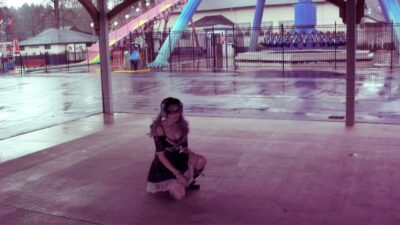
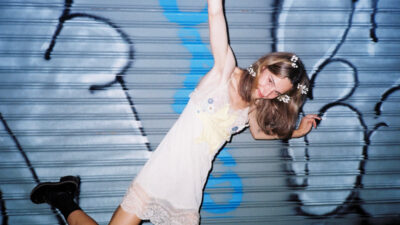
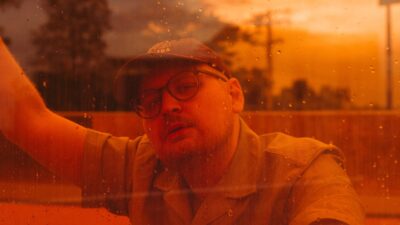
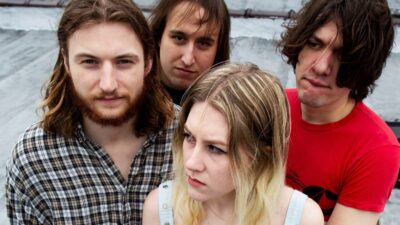

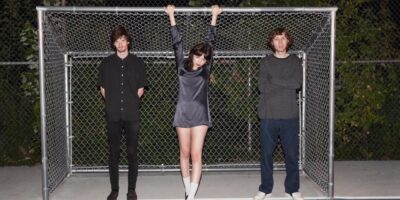

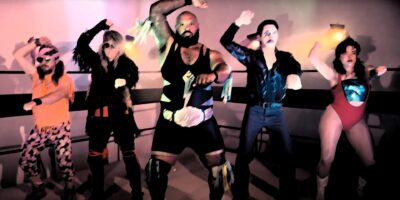
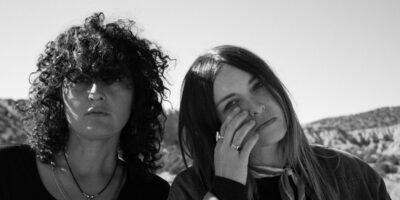





Comments